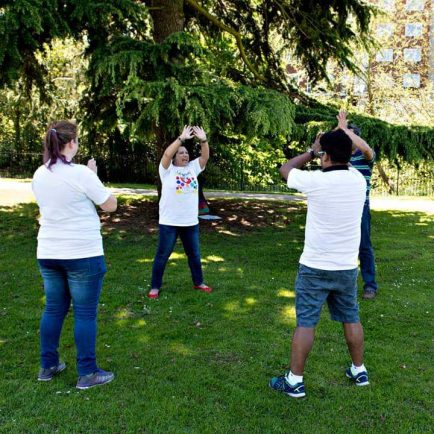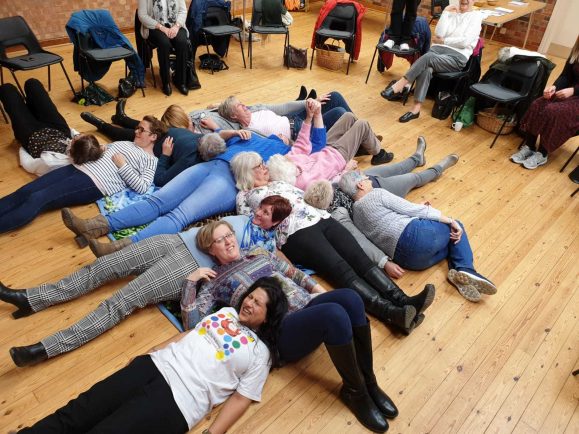CLUCKING and flapping about a tent like a chicken among a tent-full of adults was not what I had in mind when I joined the laughter yoga session at Leamington’s inaugural ‘Eco-Fest’.
While I wasn’t sure what to expect, it was more akin to a round of dad jokes while I attempted a wobbly ‘downward dog’ position which, in my opinion, would have been much more hilarious.
But the pretzel-like, body-twisting yoga, as I knew it, did not appear to be involved.
I had hoped my partner would join me in my quest to reversing a lifetime of social conditioning; instead I went alone into the clucking crowd crutchless, attempting bogus laughter and feeling far from plucky.
Around 20 of us joined positive psychology practitioner Janice Crompton Brough for the half-hour session. Some had their offspring in tow which somehow made their laughter seem more justified. I found myself wishing I had borrowed my toddler nephew to pretend I only looked ridiculous for his benefit.
To make matters worse I was a little late; a lone straggler feeling awkward about feeling awkward – like being sucked into a kind of social anxiety black hole.
Still, according to Janice, it was nothing a little ‘brain flossing’ wouldn’t fix.
This involved laughing wildly while performing a flossing-like motion either side of your head – supposedly to rid yourself of any detritus of nagging worries synonymous with being an adult.
I plastered on a smile as I weaved my imaginary floss and laughed the equivalent of somebody texting a redundant ‘LOL’.
We became penguins next which felt less excruciating than the chicken exercise. Janice instructed us to huddle together, facing the same direction and to shriek.
Perhaps the closeness of the ‘waddle’ allowed me to feel more accepted into the group, and consequently less daft. Or perhaps it was because no-one could witness how ridiculous my face probably looked.
Another exercise was to laugh into an imaginary mirror. Again, I felt a little more comfortable because I wasn’t forced to make eye contact with strangers – practically illegal unless you fancy someone.
Most, like me, began each exercise with conviction. But our laughter eventually dissolved into a fit of nervous glances and smiles.
One teacher’s pet roared with unreserved laughter and clutched his belly much to his teenage daughter’s horror. But for the rest of us the spectacle provided relief from our own insecurity and prompted a chorus of appreciative chuckles.
The therapy, founded in India 1995 by Dr Madan Kataria, is designed to help people shed their inhibitions and reunite with the self – the Sanskrit meaning of ‘yoga’. It not only eases tension but prompts the brain to release ‘feel-good hormones’ – helping to shed insecurities and connect more easily with others.
Practitioner Janice, who runs ‘Pu Tai Wellbeing’, explained: “It’s about acceptance and longing to fit in but what really helps is laughter because it’s what we have in common. It doesn’t matter how much my car is worth or what job I do; laughter is a great equaliser.
“It’s about moving away from the ego and being able to be like a child and regain that sense of connection rather than being on constant guard.”
The philosophy has been substantiated by a number of scientists who discovered laughter could regulate hormones, reduce stress and boost immunity.
American journalist Norman Cousins prompted a string of scientific studies when he cured himself of a degenerative disease with funny movies coupled with high doses of vitamin C.
And doctor turned clown Patch Adams, who inspired a Hollywood biopic starring Robin Williams, turned to laughter to help heal his patients.
However more recent studies into the practice suggest while it may boost the mood, laughter yoga is not necessarily more effective than other activities recommended to improve mental health.
Local GP Dr Hussain Al-Zubaidi from Clarendon Lodge Medical Practice referred to
a controlled trial carried out with elderly, depressed women in 2010, published in the ‘International Journal of Geriatric Psychiatry’, and a study undertaken earlier this year on the effect of laughter yoga on people of mixed ages and with varying levels of health.
She said: “The effectiveness of laughter induced yoga has been minimally explored. Where studies have been undertaken it has been shown to be at least as effective as other group exercise programs in improving depression and life satisfaction.
“A systematic review was undertaken earlier this year exploring the health benefits of laughter-based therapies. They found that ‘simulated’ aka non-humorous laughter was more effective than ‘spontaneous’ (humorous) laughter. Furthermore, they concluded that laughter inducing therapies did demonstrate an improvement in depression symptoms. It is however important to note that the various studies explored in this review were all of low quality with substantial risk for bias.
“In conclusion, although there is only scanty scientific evidence for its benefits, group exercise programs which provide a mechanism to get patients more active is always going to be recommended by healthcare professionals and it is for the individual to make a personal assessment of its merits.”
Personally, I had yet to appreciate its so-called benefits, as my inner-child remained stubbornly locked in a game of Peekaboo while laughter yogi Janice catapulted about the tent in a fit of giggles.
She began her own laughter journey some eight years ago following a relationship breakdown.
Such life events, she told me, were often reasons people turned to laughter yoga.
She explained: “Something we have in common is that we don’t tend to show our vulnerability. If you experience a loss and are in pain and suffering, society has kicked us into pretending we’re fine and so we put a face on. We block out being able to feel our feelings and then can’t let them go.
“Nowadays people are being encouraged to talk about mental health and to be comfortable with their vulnerabilities and weaknesses. The idea behind laughter is to access the emotions in the right hemisphere of our brain and train that inner critic to stop judging our emotions.
“Laughing is a form of mindfulness, a catharsis. It helps release emotions. When you get used to laughing with yourself it’s amazing what happens.”
One of the most surprising things I learned from the session was the brain did not know the difference between fake and real laughter. One of the stress-busting components of laughter is its influence on your breathing pattern. The long exhalations help flush your lungs of stale air and free up space for all-important oxygen resulting in both mental and physical benefits. It made sense given the emphasis on breathing in many stress-busting techniques.
Janice added: “Laughter triggers a physiological response even if it’s just from making the sounds. It can change the idea we need to wait to feel happy before we laugh, but we can laugh in order to feel happy.”
Although I may not have embraced the social side of pretending to laugh, I am basking in my newfound pleasure in ‘laughing’ while stuck in traffic. I take a deep breath and let rip to my inner child’s content until I’ve used up every last bit of air. And I wonder if, maybe even hope, other drivers think I’m a bit mad.
It feels quite liberating.
Janice runs classes in Warwick and Stratford. Her next laughter yoga session is on June 9 at Foundation House in Stratford.
Search ‘Pu-Tai Wellbeing’ on Facebook for more details.















